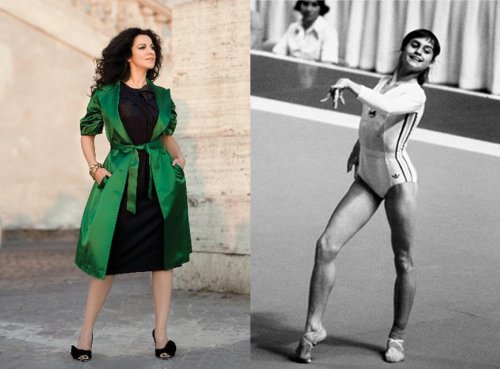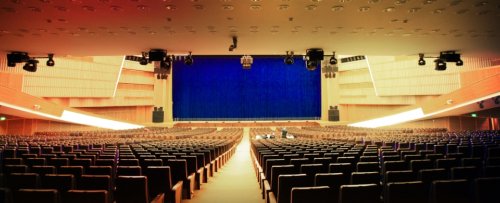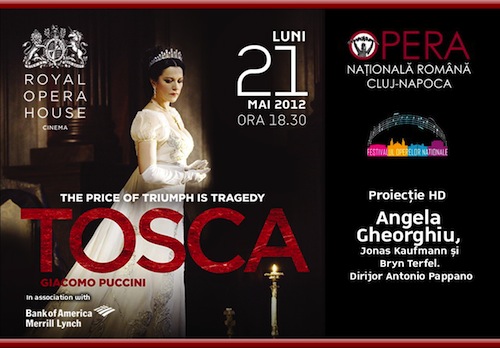I was curious who the other ROlympians are. So I dug a little bit. Found the info on the website of the Romanian Cultural Institute in Bucharest. I can't figure out the criteria they used to pair them, but there should be one.
Angela Gheorghiu, Ruxandra Donose, Sergiu Celibidache, George Enescu, Dinu Lipatti, Alina Cojocaru and many, many others. Take a look!
THE ROLYMPIANS | |
In pursuit of the athletic and cultural ideals of the ancient Olympians, Evanghelie Zappa (1800-1865), a Romanian merchant and philanthropist of Greek origin, established both the Pan-hellenic Games, the precursor of the Olympics, in 1859, and the Romanian Academy. | Nourished by the veneration for the Grecian formative model, the vision of Pierre de Coubertin (1863-1937), creator of the modern Olympic movement, was best encapsulated in his own words: “The important thing in life is not the triumph but the struggle, the essential thing is not to have conquered but to have fought well”. |
With the election of Prince George Gh. Bibescu (1834-1901) as member of the International Olympic Committee in 1899, Romania became one of the first Olympic nations in the world. | With princely silent grace and endless effort, sculptor Constantin Brâncuşi (1876-1957), one of the pioneers of modern art, urged the muses to sleep and the matter to fly. |
George A. Plagino (1878-1948), sports shooter in Paris in 1900, is the first Romanian to ever participate in the Olympic Games. | International glory, won early in his life, did not preclude prolific musician George Enescu (1881-1955) from setting himself the most demanding moral and artistic targets. |
The bronze medal won in Paris in 1924 by the rugby team, which included Dumitru Armăşel, Ion Gârleşteanu, Soare Sterian, Gheorghe Benţia and Mircea Stroescu, was Romania’s first Olympic distinction. | “The Generation of 1927”, formed by brilliant young writers and philosophers such as Mircea Eliade, Emil Cioran, Petru Comarnescu, Mihail Sebastian, Mihail Polihroniade, Alexandru Cristian-Tell, Constantin Noica, Eugen Jebeleanu, Zaharia Stancu, Haig Acterian, did not make a less impetuous entrance in Romanian, and later world culture. |
At the 1936 Munich Games, against all odds, Henri Rang (1902-1946) won the first Romanian Olympic silver medal for individual showjumping, riding his horse Delfis. | Rather than jumping fences, the DADA movement founder Tristan Tzara (1896-1963) defiantly cavalcaded against taboos and aesthetics, putting on a show of iconoclastic avant-garde art. |
Before losing his sight, sports shooter Iosif Sârbu (1925-1964) became the first Romanian to win an Olympic gold medal, in Helsinki, in 1952. | The genius of Dinu Lipatti (1917-1950), a pianist of sublime purity and a refined composer, was muted by death at a young age. |
In Melbourne in 1956, Nicolae Linca (1929-2008) courageously fought with a serious injury to his right hand, to become Romania’s first Olympic boxing champion. | In every page he wrote, on the heights of despair, the philosopher Emil Cioran (1911-1995) punched with the same skill and devastating effect. |
Despite competing with a sprained ankle, daring Leon Rotman (b.1934) won the first two Romanian Olympic gold medals for canoeing, at Melbourne in 1956. | Jean Negulescu (1900-1993), the film director who taught the world How to marry a millionaire, is the only Romanian to have found gold in Hollywood. |
Dumitru Pârvulescu (1933-2007), nicknamed Little Hercules, was Romania’s first Greco-Roman wrestling Olympic champion. | Trained as a mathematician, famous conductor Sergiu Celibidache (1912-1996) saw music as a religious experience and rejected recordings as precarious in comparison to live performances. |
Double Olympic champion Iolanda Balaş (b. 1936) dominated the high-jump world competitions for almost a decade, breaking 14 records. | Novelist Gabriela Adameşteanu (b.1942) aimed high with her unforgiving depictions of banal monsters that formed the backbone of the Communist social experiment. |
Competing at six Olympic Games, Lia Manoliu (1932-1998) was Romania’s most enduring Olympian. In 1974, UNESCO acknowledged her commitment to the ideals of fair and loyal competition by awarding her the prestigious Pierre de Coubertin Fair Play Trophy. | From her Parisian exile imposed by the Communists, no less tenacious Monica Lovinescu (1923-2008), media broadcaster and literary critic, fought and won all the battles to unchain the imprisoned minds of her fellow Romanians. |
Mihaela Peneş (b.1947) was only 17 years old when she became the Olympic javelin champion in Tokyo, in 1964. | Poet Ileana Mălăncioiu (b.1940), ”an Antigone with the soul of an Electra”, found her way to the truth of life by piercing the deceitful veils of reality. |
Viorica Viscopoleanu (b. 1939) broke the Olympic record and emerged as the victor at long jump in Mexico, in 1968. | Lena Constante (1909-2005), visual artist and essayist, left an inestimable account of the inferno of Stalinist detention, which she lived through with dignity and stoicism. |
Ionel Drâmbă (1942-2006) fended off all his competitors and won the first gold medal in fencing for Romania, at the Mexico Olimpics, in 1968. | For Victor Brauner (1903-1966), a surrealist painter of Romanian-Jewish descent, art, rooted in the deepest apprehension, was the only meaningful reality: “Painting is life, the real life, my life.” |
With their bronze medal for bobsleigh, Ion Panţuru (b.1934) and Nicolae Neagoe (b.1941) are the only Romanians victorious at the Winter Olympics. | One of the greatest moral consciences of the 20th century, writer Mihail Sebastian (1907-1945), a consummate and passionate skier, bitterly witnessed his friends descent into the abysses of moral abandon. |
In Munich in 1972, colossal Nicolae Martinescu (b.1940) burst into tears at the news that he was the new Olympic champion of Greco-Roman wrestling, the heavyweight class. | Protean talent, Liviu Ciulei (1923-2011), one of the most influential theatre directors of the 20th century, is also the first Romanian to have received a directing prize in Cannes, in 1965. |
His lightening acceleration brought sprint canoer Vasile Dâba (b.1954) a plethora of medals, including the Olympic gold in Montreal, in 1976. | Intransigent and uncompromising, Lucian Pintilie (b.1933), the greatest Romanian film director of all times, has revealed the pervasive evil of a wounded society. |
Nadia Comăneci (b.1961), the undisputed queen of Romanian Olympic history, redefined perfection and grace in gymnastics. | Triumphant on the most important opera stages, soprano Angela Gheorghiu (b.1965) is now the best known Romanian living artist in the world. |
Gheorghe Berceanu (b.1949) transcended his diminutive constitution and won the gold for Greco-Roman wrestling, light flyweight class, in Munich, in 1972. | Novelist and essayist Norman Manea (b. 1936) has wrestled with the hypocrisy and the brutality of dictatorships, succeeding to break up the pinfall with each new book he published. |
Nowhere did Corneliu Ion (b.1951) perform better than in Moscow in 1980, where his artful shots brought him the gold medal for rapid-fire pistol. | Paul Neagu (1938-2004), Romanian-British artist and professor, spent all his life exploring the metaphysical dimension of sculpture. According to Anish Kapoor: “His intellectual clarity was refreshing in an era when ‘making’ seemed to be more important than thinking.” |
A son of the magic Danube Delta, “Admiral” Ivan Patzaichin (b.1949), multiple Olympic champion, reigned the world’s canoeing competitions for decades. | Theatre director Andrei Şerban (b.1943) has won world-wide praise for his daring and innovative interpretations of classical works on the stage. |
Toma Simionov (b.1955) teamed up with Ivan Patzaichin to conquer the liquid circuits of the Olympic Games for many years. | Elusive and profound, Ion Grigorescu (b.1945) has transformed his body into the most revealing and unsettling artistic tool. |
With her rich crop of gold medals, Ecaterina Szabo (b.1967) made history as one of the most awarded Romanian gymnasts. | A versatile writer, mastering with equal ease all literary genres, Mircea Cărtărescu (b.1956) has become the towering figure of Romanian letters in the recent past. |
Multiple weightlifting champion Nicu Vlad (b.1963) has inspired a whole generation of gifted athletes competing under his guidance. | With his films, Cristi Puiu (b.1967) has single-handedly reinvented Romanian cinema and has shown the way for a generation of award-winning Romanian film-makers. |
Greco-Roman wrestler Vasile Andrei (b.1955) found gold in California, in 1984. | Admired for his grandiose and colorful style, theatre director Silviu Purcărete (b.1950) has marked the world stage with his flamboyant take on reality. |
Her famed speed and tactical brilliance helped Doina Melinte (b.1956) brake record after record and win the gold medal at the Los Angeles Olympics, in 1984. | Mezzosoprano Ruxandra Donose’s superb voice and dazzling stage presence have brought the audiences of the greatest musical theatres in the world at her feet. |
Beautiful and dangerous, Laura Badea (b.1970) is the first Romanian female fencer to win an Olympic gold medal, in Atlanta, in 1996. | In his novels, which have been translated all over the world, Filip Florian (b.1968) skilfully duels with the shadows of Romania’s past. |
In praise of the unique style of Marius Urzică (b.1975), multiple Olympic champion, some of the most acrobatic elements on pommel horse and parallel bars bear his name. | Always vigilant and sharp, the drawings of Dan Perjovschi (b.1961) humorously capture the essence and immediacy of a wide variety of contemporary moral, social, and political subjects. |
Triumphant at Sydney in 2000, Diana Mocanu (n.1984) was the first Romanian to win a gold medal at swimming. | |
Defeating a seemingly invincible rival in Beijing, in 2008, Alina Dumitru (b. 1982) brought Romania its first gold medal for judo. | Alina Cojocaru (b.1981), principal ballet dancer with The Royal Ballet in London, has defeated gravitation and has become “the ballerina of the decade”. |
Having the musketeers as role models, Mihai Covaliu (b. 1977) took home a gold medal from the 2000 Sydney Olympics. | For his disturbing depiction of young people’s life in the terminal phase of the Communist regime, Cristian Mungiu (b. 1968) has received the greatest accolades ever to grace a Romanian film-maker. |
After a breathtaking race, Constantina Diță Tomescu (b. 1970) brought Romania the first victory at the marathon, winning gold in Beijing, in 2008. | With Herta Müller (b.1953), the Nobel Prize for literature was awarded to an author born in and haunted by the memory of communist Romania, who chose to disclose the moral abysses of political repression. |





















